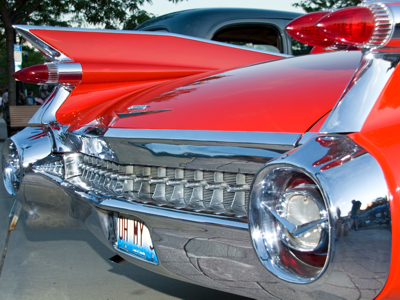
I would like to give my daughter my newer car (worth about $9,000) and she would get rid of her older car (worth about $4,000). She currently does not pay any income tax. Should we exchange cars so that I can gift her car for the tax deduction?
Sometimes a simple question doesn’t have a simple answer. Here’s how to use this exchange and still minimize your taxes:
Taxation on buying or selling a car in Virginia
Virginia has a vehicle “Sales and Use” tax. This one-time tax is based on 3% of a vehicle’s gross sales price, and is charged whenever a vehicle changes ownership. During the titling process, the state takes either the 3% rate or $35, depending on which one is higher.
Gift of a vehicle from parent to child
No tax is imposed if the transfer meets any of a number of exemptions. One of those exemptions is, “a gift to the spouse, son, or daughter of the transferor.” In order to qualify for this Sales and Use Tax exemption you must fill out DMV Form SUT 3: Purchaser’s Statement of Tax Exemption. (All of the DMV vehicle forms are available at https://www.dmv.virginia.gov/forms/default.aspx)
The DMV SUT3 must be notarized by a notary public. We have several notaries public in our office just for such occasions.
Gift of a vehicle from child to parent
There is no Sales and Use exemption available for a gift from child for parent. Such a transfer is subject to a fee of 3% of the sales price or $35 whichever is greater. You can document the sale at $0.
Again, the DMV has in its list of forms a form for this transaction. The form is SUT 1: Vehicle Price Certification (Bill of Sale) This form is used by individuals (not motor vehicle dealers) to certify the purchase price of a motor vehicle more than 5 years old in order to obtain a vehicle title. If the vehicle is 5 years or younger, you need to use form SUT 1A: Affidavit for Procurement of Title. The SUT 1 does not need to be notarized, but the SUT 1A does need to be certified.
Tax planning issues
Since the transfer of vehicle from child to parent only costs $35 and the donation of the vehicle will reward you with a $4,000 tax deduction it would make sense for you to take ownership of the vehicle and donate it yourself rather than for your daughter to donate it. If you are in the 15% marginal tax bracket the donation is worth $600. If you are in the 25% tax bracket the donation is worth $1,000.
Alternately, selling a $4,000 car on Craig’s list for $3,000 is attractive and easy. And that is worth, well, $3,000.
Do car donations still make sense under stricter IRS regulations?
Honestly, no. The IRS has made it difficult enough that I would recommend selling it on Craig’s List instead.
- The charity has to be eligible to receive tax deductible contributions.
- The charity has to accept non-cash donations.
- You must get a receipt from the charity for your car donation.
- Non-cash donations are one of the common items that can cause an audit.
- You must complete Section A of IRS Form 8283 if the car is worth more than $500.
- The charity must provide you with certification about the sale.
- Your deduction is limited to what they actually sell the car for.
- If they don’t sell the car they have to provide you with documentation of their use or improvement of the car.
- An independent appraisal is required if the car is worth more than $5,000.
- Take photos and save receipts for any documentation about new tires, engines, or other improvements.
Or, just sell the car on Craig’s List and pocket the cash.
Documentation of a bill of sale
Sometimes it is important to document the sale of something and to have a separate bill of sale as proof of the transaction. While a sale of $0 may be necessary to qualify for the gift from parent to child, there are other occasions where the dollar amount is important. Here is example language for a bill of sale:
Bill of Sale: State of Virginia, County of Albemarle: $40 for a 1769 Morgan Carriage.
For and in consideration of the sum of $40.00 U.S. Dollars, exclusive of any sales tax, paid by cash, the receipt of which is hereby acknowledged, Thomas Jefferson (the “Seller”) of Monticello 931 Thomas Jefferson Pkwy, Charlottesville, VA 22902 does hereby sell, assign, and transfer to Martha Jefferson (the “Buyer”) of Monticello 931 Thomas Jefferson Pkwy, Charlottesville, VA 22902, the following described property (the “Property”): a 1769 Morgan carriage.
The Property is being sold on an “AS IS” basis and the Seller explicitly disclaims all warranties, whether expressed or implied, including but no limited to, any warranty as to the condition of the Property. However, the Seller’s above warranty disclaimer does not, in any way, affect the terms of any applicable warranties from the manufacturer of the Property.
The Buyer has been given the opportunity to inspect the Property, or alternatively, have the Property inspected. Additionally, the Buyer has accepted the Property in its existing condition.
In witness whereof, the parties have executed this Bill of Sale on July 4, 1775.
By Thomas Jefferson 7/4/1775, Monticello 931 Thomas Jefferson Pkwy, Charlottesville, VA 22902
By Martha Jefferson 7/4/1775, Monticello 931 Thomas Jefferson Pkwy, Charlottesville, VA 22902
Before you visit the DMV
Make sure that you have obtained insurance before visiting the DMV. They will not transfer title if you have not already obtained insurance.
Photo of Oh My taken by Brian Jelonek and used here under Flickr Creative Commons.